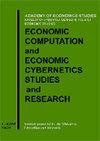中药供应链质量欺骗行为的四维演化博弈分析
IF 1
4区 经济学
Q3 ECONOMICS
Economic Computation and Economic Cybernetics Studies and Research
Pub Date : 2023-09-22
DOI:10.24818/18423264/57.3.23.09
引用次数: 0
摘要
本文章由计算机程序翻译,如有差异,请以英文原文为准。
A Four-dimensional Evolutionary Game Analysis of Quality Cheating Behavior in Traditional Chinese Medicine Supply Chain
. A sustainable supply chain of Traditional Chinese Medicine (TCM) is vital for public health. However, for many years, TCM manufacturers have suffered from the quality cheating behaviours of their suppliers (Chinese herbal medicine providers). Aiming at managing those quality cheating behaviours and improving the potency of TCM effectively, a four-dimensional evolutionary game model composed of Chinese herbal medicine suppliers and TCM manufacturers was established, and two quality inspection methods were introduced: chemical inspection and biological assay inspection were introduced to screen unqualified and low-potency Chinese herbal medicines (CHM), respectively. The model results are obtained through the analysis of stable strategy and evolution paths, and the influence of some parameters such as the percentage of suppliers selected, rewards, and punishments on the evolutionary stable state was analysed by numerical simulation experiments in the MATLAB software. The results showed that TCM manufacturers can reach an optimal state: purchasing high-potency CHM at the lowest possible inspection costs. The government regulators and manufacturers can improve the quality of CHM by changing the above parameters.
求助全文
通过发布文献求助,成功后即可免费获取论文全文。
去求助
来源期刊

Economic Computation and Economic Cybernetics Studies and Research
MATHEMATICS, INTERDISCIPLINARY APPLICATIONS-
CiteScore
1.80
自引率
22.20%
发文量
60
审稿时长
>12 weeks
期刊介绍:
ECECSR is a refereed journal dedicated to publication of original articles in the fields of economic mathematical modeling, operations research, microeconomics, macroeconomics, mathematical programming, statistical analysis, game theory, artificial intelligence, and other topics from theoretical development to research on applied economic problems.
Published by the Academy of Economic Studies in Bucharest, it is the leading journal in the field of economic modeling from Romania.
 求助内容:
求助内容: 应助结果提醒方式:
应助结果提醒方式:


